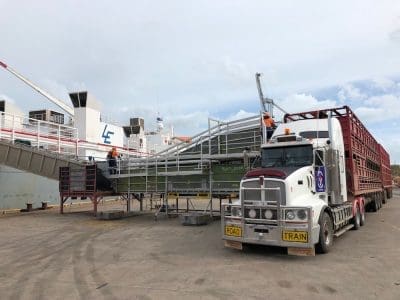CAMPAIGNS against livestock exports, intensive farming and mulesing are increasingly targeting rural lenders as animal rights groups pressure banks to choke off capital to industries and practices they oppose.
 In March Animals Australia published a “scorecard” ranking banks on whether they have an animal welfare policy, if they finance live export or intensive farming and if they require businesses they finance to use pain relief on animals.
In March Animals Australia published a “scorecard” ranking banks on whether they have an animal welfare policy, if they finance live export or intensive farming and if they require businesses they finance to use pain relief on animals.
Animals Australia told Beef Central it has been engaging with the senior management of many of Australia’s banks for the past two years, calling on them to publish transparent animal welfare policies which detail their approach and expectations relating to animal welfare within the businesses they finance.
“Where they do not have a policy, we have actively encouraged them to adopt one, to enable their customers and the community more broadly to better understand how they manage this issue of significant social concern within their client businesses,” an Animals Australia spokesperson said.
Anecdotal reports have also emerged of major rural lenders refusing to do business with some customers directly involved in the livestock export sector.
Earlier this month Victoria’s Weekly Times newspaper reported that a livestock exporter was told by NAB that any income he received from live export could not be included in a loan application, because of ‘sensitivities’ surrounding the trade.
One livestock exporter, who asked not to be named, told a similar story to Beef Central about having had a personal loan application denied in similar circumstances two weeks ago.
Another said his recent application for a simple business transaction account was rejected by several banks before he found a bank prepared to accept his business.
The trend has prompted anger among industry representatives who have accused banks of stepping beyond their remit to appease agenda-driven groups, and contributing to the business model of activism (see separate story).
Beef Central asked major rural lenders to outline their position in relation to lending to the livestock export sector.
In their responses,, none said they would not finance or deal with individuals or businesses in the livestock export sector.
However, they all also emphasised their adherence to Environmental, Social and Governance (ESG) assessment processes and their expectation that customers comply with animal welfare standards and regulations.
Animals Australia said that following its engagement with banks, a number had published statements outlining their approach to animal welfare, including Bendigo and Adelaide Bank, Bank of Queensland and HSBC Australia.
“All of the banks we have engaged with have confirmed that animal welfare is an issue they take seriously within their due diligence processes, lending standards and expectations of their clients,” a spokesperson said.
“To its credit National Australia Bank, the nation’s largest agribusiness lender, was sufficiently concerned about animal welfare as both a financial risk and an issue of community and business concern that it developed and published its Animal Welfare Principles document in November last year.
“Out of interest, you may be aware that Rabobank is a significant domestic agribusiness financier and they have had a detailed global animal welfare policy in place for many years.”
The only bank to meet all Animals Australia criteria for animal welfare was Bank Australia, formerly the CSIRO Cooperative Credit Society, a customer-owned banking cooperative with 20 branches around Australia.
“The live export industry constantly insists that it takes animal welfare seriously, so should have no concerns about providing the assurances and transparency required by the institutions that lend to them,” the Animals Australia spokesperson said.
Animals Australia said research conducted for the Federal Department of Agriculture by Future Eye in 2018 found there was a gap between societal expectations and the regulatory reality surrounding the treatment of animals in Australia, and significant community concern about the treatment of farmed animals and current levels of regulation. It said the report showed that not responding to evolving societal expectations was “a key threat to these industries”.
Asked if it is within consumer and competition law for banks not to provide services to individuals or businesses working in an industry that may be the focus of some public sensitivity, but which operates legitimately, an ACCC spokesperson said the commission was unable to comment on specific businesses.
However, in most cases, businesses had the right to decide who they do business with.
Statements received from each bank on their approach to lending to the live export sector are:
NAB
“As Australia’s leading agribusiness bank, we understand the agricultural industry is a fundamental part of Australia’s economy and note that Australia is the world’s largest exporter of livestock.
We continue to support customers in this agribusiness sub-sector.
NAB’s commitment to lending and supporting growth in the Agribusiness sector has not changed. The Animal Welfare Principles we announced on 15 November 2019 are a continuation of our efforts to support our customers as they continue to improve the welfare standards of their agribusinesses. We are working with our customers to help them understand the principles, and ensure their practices meet the relevant legislative, regulatory and industry standard requirements.”
Westpac
“We value customers that operate in ways that avoid or minimise environmental and social impacts; support the adoption of better management practices and technologies – particularly animal welfare, land and soil management, labour and community rights, biodiversity protection, emissions management and water use – and active participation in industry initiatives and roundtables which focus on improvement of environmental and social performance.
We seek to develop relationships with customers that… Treat livestock with due care, in compliance with relevant jurisdictional animal welfare regulations and in line with industry best practices.”
CBA:
“We adhere to an Environmental, Social and Governance (ESG) assessment process, that considers environmental and social impacts of all institutional and large business loans. This is a key step in our due diligence process.
“We also expect our business customers and suppliers to adhere to the minimum standards outlined in our Environmental & Social Framework.
“Our Regional Banking teams regularly engage with a number of community and industry stakeholders, across a variety of industries, as part of our continued commitment to environmental and social risk management.”
Rabobank:
“Rabobank’s lending policies are unchanged.
Australia has among the strictest regulations for animal welfare standards in the world. These have been determined between government, regulators and industry.
Rabobank expects those standards to be maintained or exceeded by our clients and their service providers on all forms of animal transportation.
Animal welfare in farming and the agricultural supply chain is a key element of Rabobank’s sustainability focus in Australia and globally.
As part of a major global agribusiness specialist, the bank has client relationships with companies which have involvement in the live export trade, as well as producers who supply this market.”
Don’t bow to ‘radical activism’, rural leaders urge banks
Anecdotal reports of banks bowing to animal rights group pressure to cut off finance to businesses connected to the industry have sparked angry responses from livestock export and cattle producer leaders.
The Australian Livestock Exporter’s Association said banks changing agricultural lending policies in response to animal rights group pressure were overlooking the significant amount of work invested in animal welfare by the industry, and were “just creating further business models for animal activist organisations”.
 “This does not promote or support the industry and the genuine care producers, exporters and importers have for the animals in the supply chains,” ALEC CEO Mark Harvey-Sutton (right) said.
“This does not promote or support the industry and the genuine care producers, exporters and importers have for the animals in the supply chains,” ALEC CEO Mark Harvey-Sutton (right) said.
The livestock export industry is determined to continually achieve improvements in the industry’s sustainability and animal welfare outcomes, and continued to implement industry-led changes and uphold regulatory requirements, he said.
Australia’s livestock export industry was well recognised as a global leader in live export and animal welfare, and had invested in countless initiatives that can quantify best-practice.
The Australian Beef and Sheep Meat Sustainability Frameworks, which were reviewed annually, were examples of world-leading, industry-led initiatives developed across the supply chain.
“Livestock exports are an important part of Australian agriculture providing our trading partners with certainty around food security and fulfilling our global responsibilities at this challenging time of COVID-19,” he said.
“We would encourage all financial institutions to acknowledge the importance of the live export industry, the economic contribution and choices it offers to our producers, and importantly especially at this time the job security for regional Australia throughout the whole of the supply chain.”
A livestock exporter, who asked not to be named, said he recently tried to open a business account, but was rejected by several banks.
He said none of the banks would give him an explanation in writing, but said he was told verbally by representatives at each bank that his application would not be supported because he worked in the livestock export trade.
He said banks should be upfront about their policy.
“My point to them is, if that is the way you want to go, at least have the guts to tell everyone,” he said.
“Go and tell all these farmers in northern Australia who are paying you millions in interest that you are actively trying to shut down the industry that keeps them alive.“
The apparent refusal of some banks to lend to industries they believe are “socially sensitive” – such as firearms and live animal exports – has been condemned by AgForce as not only discriminatory but an irresponsible handbrake on economic and jobs growth.
AgForce chief executive officer Mike Guerin acknowledged that banks needed to have robust lending criteria but said that singling out certain industries to suit ‘activist agendas’ jeopardised the agriculture industry when it was most needed.
“It is worrying that some banks appear to be compromising sensible and appropriate commercial decisions because of intimidation by single-issue activists, in some cases within their own senior staff,” Mr Guerin said.
“Australia’s financial institutions are vital partners in Australian agriculture, enabling farm businesses and the industries which support them to develop and grow.
“To jeopardise the immediate viability and, longer term, the capacity for growth of our agriculture industry at this critical point in human history on the whim of a minority is foolish – and also poor business sense.”
Mr Guerin said AgForce had approached the Australian Banking Association to address its concerns at a national level.
NTCA president and Alice Springs cattle producer Chris Nott said producers would vote with their feet if banks turned their back on the industry.
“When you consider how much live export is worth in the scheme of the Australian beef industry, they’re playing in a dangerous patch,” he said.
Mr Nott said banks were overstepping by attempting to set standards for an industry already subject to high levels of industry and government regulations.
Last year’s Royal Commission into Misconduct in the Banking, Superannuation and Financial Services suggested banks should be more focused on fixing their own back yards, he said.
“Banks need to realise the biggest thing for the next 20 years is going to be water security, food security, and power.
“When you take a long term view about food security and developing the north, if I was a banker I’d be mad to be sticking my head out that far,” he said.
“Don’t worry about starting to dictate and putting pressure on us with double standards, it is short-sightedness.”




The banks of in question are not “contributing to the business model of activism” – they are contributing to the business model of human decency and compassion.
None of the statements quoted from the banks gave anything that could be called an ‘assurance’. ‘Expectations’ are no more than sweetener statements, with neither bark nor bite.
The statements by ALEC (Harvey-Sutton) Guerin and Nott would represent a great amount of rural thinking; however, the hysterical approach ‘they are trying to close down our industry’ is not the case when attempting to force all rural people and their suppliers exporters and abattoirs to act decently, kindly and responsibly in all aspects of rural endeavours. That is not happening and has commonly not been happening since Australia was settled.